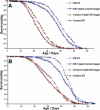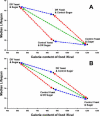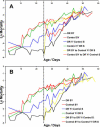Calories do not explain extension of life span by dietary restriction in Drosophila
- PMID: 16000018
- PMCID: PMC1140680
- DOI: 10.1371/journal.pbio.0030223
Calories do not explain extension of life span by dietary restriction in Drosophila
Abstract
Dietary restriction (DR) extends life span in diverse organisms, including mammals, and common mechanisms may be at work. DR is often known as calorie restriction, because it has been suggested that reduction of calories, rather than of particular nutrients in the diet, mediates extension of life span in rodents. We here demonstrate that extension of life span by DR in Drosophila is not attributable to the reduction in calorie intake. Reduction of either dietary yeast or sugar can reduce mortality and extend life span, but by an amount that is unrelated to the calorie content of the food, and with yeast having a much greater effect per calorie than does sugar. Calorie intake is therefore not the key factor in the reduction of mortality rate by DR in this species.
Conflict of interest statement
Competing interests. The authors have declared that no competing interests exist.
Figures





References
-
- Masoro EJ. Amsterdam: Elsevier; 2002. Caloric restriction: A key to understanding and modulating aging; 183 pp.
-
- Weindruch R, Walford RL. Springfield (Illinois): Thomas; 1988. The retardation of aging and disease by dietary restriction; 436 pp.
-
- McCay CM, Crowell MF, Maynard LA. The effect of retarded growth upon the length of life span and upon the ultimate body size. J Nutr. 1935;10:63–79. - PubMed
-
- Jiang JC, Jaruga E, Repnevskaya MV, Jazwinski SM. An intervention resembling caloric restriction prolongs life span and retards aging in yeast. FASEB J. 2000;14:2135–2137. - PubMed
Publication types
MeSH terms
Substances
Grants and funding
LinkOut - more resources
Full Text Sources
Other Literature Sources
Molecular Biology Databases

